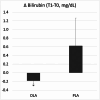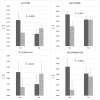An olive oil-derived NAE mixture (Olaliamid®) improves liver and cardiovascular health, and decreases meta-inflammation in naturally obese dogs: a double-blind, randomized, placebo-controlled study
- PMID: 40764576
- PMCID: PMC12326773
- DOI: 10.1186/s12917-025-04946-y
An olive oil-derived NAE mixture (Olaliamid®) improves liver and cardiovascular health, and decreases meta-inflammation in naturally obese dogs: a double-blind, randomized, placebo-controlled study
Erratum in
-
Correction: An olive oil-derived NAE mixture (Olaliamid®) improves liver and cardiovascular health, and decreases meta-inflammation in naturally obese dogs: a double-blind, randomized, placebo-controlled study.BMC Vet Res. 2025 Nov 29;21(1):694. doi: 10.1186/s12917-025-05155-3. BMC Vet Res. 2025. PMID: 41316229 Free PMC article. No abstract available.
Abstract
Background: Canine obesity is a common disorder accompanied by a low-grade chronic inflammation and is considered a risk factor for liver and heart diseases. The present study aimed to investigate whether an olive oil-derivative enriched in N-acylethanolamines (Olaliamid®, OLA) may protect dogs against obesity-induced comorbidities.
Results: Twenty-seven dogs of mixed breed and size with a body condition score ≥ 7/9 were included in the trial, once provided they were otherwise healthy. Dogs were fed a commercial maintenance diet for two weeks before enrolment, and randomized in two groups, i.e., OLA (n = 14) and placebo (OLA vehicle; n = 13). Both treatments were administered orally by the owners in a liquid form at 0.7 ml/5kg body weight, once a day for three months. At baseline and three months later dogs underwent physical examination, blood draw, and echocardiography. At the same timepoints, owners were given a questionnaire about their dog's general condition. OLA prevented the increase in leptin observed in the placebo group (P = 0.011), decreased IL-6 (P = 0.043) and derivatives-reactive oxygen metabolites (d-ROMs, P = 0.008), and increased biological antioxidant potential (BAP) compared to the placebo group (P = 0.032). Moreover, OLA protected the liver, with ALT levels being decreased in the OLA group compared to the placebo one (P = 0.005) and bilirubin levels being decreased in the OLA group (P = 0.030) but not in the placebo one. OLA showed a cardioprotective effect, with a significant decrease of IVSdN (P = 0.028), LVPWdN (P = 0.047), IVSd/LVIDd (P = 0.015) and LVPWd/LVIDd (P = 0.034) compared to the placebo group. According to dog owners, the difficulty rising from lying down significantly increased in the placebo group (P = 0.039) but not in the OLA one.
Conclusion: Overall, OLA improved obesity-induced meta-inflammation and oxidative status and helped to ameliorate liver and heart health as well.
Keywords: Cardiovascular parameters; Dog; Liver; Obesity; Olaliamid®; Oxidative stress.
© 2025. The Author(s).
Conflict of interest statement
Declarations. Ethics approval and consent to participate: The experimental protocol was reviewed and approved by Ethical Animal Care and Use Committee of the University of Naples Federico II. Written informed consent was obtained from the owners for the participation of their animals in this study. Consent for publication: Not applicable. Competing interests: The authors declare no competing interests. Supplementary Information: Supplementary information accompanies this paper at [link provided by the journal]. Additional file 1. Raw data of all variables analyzed in this study.
Figures






References
Publication types
MeSH terms
Substances
Grants and funding
LinkOut - more resources
Full Text Sources
Medical

